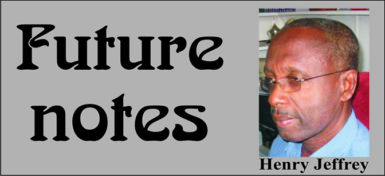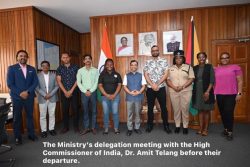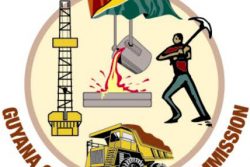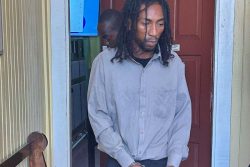 Let me thank Mr. Clement Rohee for publicly engaging me on perhaps the most important question that has been on the political agenda of Guyana for the past 60 years: ‘how do we get to a government that can ensure the psychological and actual peace and prosperity for all of us[?]’ (There is a place for everyone in the PPP, SN 7/2/2017). All the other major social problems in Guyana take on the intensity they do largely because we have not yet arrived at a practical answer to this question.
Let me thank Mr. Clement Rohee for publicly engaging me on perhaps the most important question that has been on the political agenda of Guyana for the past 60 years: ‘how do we get to a government that can ensure the psychological and actual peace and prosperity for all of us[?]’ (There is a place for everyone in the PPP, SN 7/2/2017). All the other major social problems in Guyana take on the intensity they do largely because we have not yet arrived at a practical answer to this question.
Usually it is catastrophe, not wisdom that is the catalyst that forces the leadership in countries such as ours to adopt the necessary solutions, and one would have thought that over the decades we have had enough disasters to spare ourselves more harm. This has not, however, happened, so the discourse must continue, and Mr. Rohee, given your location as a long time senior member of the PPP, after taking this opportunity to clear the decks somewhat, I am hoping that we can help to move the process forward.
When many questions are asked, it is time consuming to respond, so although what follows is my response to only a selection of what I consider the more important points Mr. Rohee raised, I must beg the editor’s sufferance.
I recommended that after the PPP/C’s disastrous 17-year rule, rather than threatening to soon take government again for another 25 years, your party would do better to craft a ‘sensible response’ to win back public support (About the PPP, SN 1/2/2017). To this suggestion you enquired ‘to whom this response should be directed?’
Mr. Rohee, I suggest that your party’s response be directed to all Guyanese, but more specifically, that it be crafted to give comfort to those who are of the opinion that you badly mistreated them in the past. Furthermore, I believe that it would be appropriate to indicate to all our politicians that these kinds of predictions portray the underlying undemocratic nature of the mentality of all those who make them and thus can contribute only negatively to democratic learning and practice.
If our enterprise is not to be stillborn we will have to agree to carefully assess the ‘facts’ before us, not soar into flights of fancy, and to be very candid with our audience. You began the substantive part of your missive with the claim that, ‘The “near universal belief” that Dr Jeffrey refers to is highly questionable in today’s context’ and then proceeded to advise that I should consult ‘Hinds’ sight,’ the weekly Chronicle column by Dr. David Hinds, to acquire a better understanding of what is taking place in Guyana, for I am one of those intellectuals with neither a foot nor an ear on the ground.
What I actually said was that there is a ‘near universal belief among Africans that … the PPP is now the ‘Worst Possible Alternative’ government. Had you presented and then denied this contention, I am almost certain that even a substantial number of your supporters would be wondering whose feet and ears are on the ground!
However, dutiful as I usually am, I took your advice, consulted ‘Hinds’ sight’ and read the following: ‘I do not want the PPP to put its hands on power in the near future, at least not by themselves and not with the current crowd in charge. Guyana cannot and should not be subjected to another round of extreme abuse that is sure to come from that party. But we should not let the fear of the PPP lead us to condone the lethargic and uninspiring leadership of the government’ (Chronicle 11/02/2017).
Mr. Rohee, given its place in the socialist pantheon, the ‘dialectical method’ will crop up again and my understanding is that it does not facilitate all manner of untenable speculations and what ifs. To my contention that government with a small majority should be avoided, your response was, ‘But what if the PPP won …. in a landslide?’ After all Hillary Clinton lost, Brexit occurred and there are ‘big political upheavals’ in Europe.
Well, even in its heyday the PPP never won by a landslide and the international political developments you identified better suggest an enhancement of our ethnic condition. But since all things are possible, assuming an ethnically differentiated ‘landslide,’ our ethnic political problem would be well on the road to a solution!
It is good that Mr. Rohee noted that in the past I have argued against shared governance because in our condition it would lack a robust opposition. Political thought and positioning are not static, they must respond to situations as they are or reasonably could become and our discourse that seeks to bring about change is rooted in this belief.
Yet there might be those who are tempted to view my current position as opportunism, so let me briefly indicate its development. In my 1995 budget presentation, I argued that given the PPP/C national ethnic majority, the issue of shared governance would be raised unless the opposition properly organised itself to have a chance of taking government.
By 2002 it was becoming quite obvious that neither the government nor opposition was doing enough to change the situation. In a widely publicized paper, Establishing Normal Politics in Guyana (25/4/2002), I argued that ‘In my view, power sharing is the less desirable alternative at this stage. However, if … normal politics (possibility of regime turnover) is not urgently established power sharing remains an alternative.’ To head off this situation ‘the PPP must be prepared to help establish and work a political system with a higher possibility of its losing government.’ As the 2015 election showed, the PPP/C could now lose, but even if it (or the APNU) wins, unless it does so by a well differentiated majority, the problem of marginality becomes important and must be addressed.
If the issue of an alternative form of governance is to be pursued, the regime of the day must be involved. I said in my article the PPP/C has ‘no moral legitimacy’ to publicly raise the issue of sharing government, APNU+AFC is not raising it as promised in its manifesto, and indeed, is blocking the PPP from raising it surreptitiously.
My reading of Mr. Rohee is that he is questioning how, with the government doing nothing to ease the ethnic status quo, I can then attack the PPP for ‘devising a dangerous strategy of ethnic mobilization to attempt to recapture its majority.’ Oddly, he then challenged me to prove the PPP did any such thing. Furthermore, ‘Jeffrey needs to demonstrate that the coalition ‘has clean hands when it comes to ethnic mobilization’ for ‘[t]he plague cannot be on both houses.’
No nexus
There is no nexus between the PPP’s pre-election radical ethnic mobilisation and the coalition’s post-election reneging on its promises, and I did not attempt to make one in my presentation. Further, I want to suggest that Mr. Rohee was only trying to placate his leader when he required proof that his party was involved in extreme ethnic mobilisation during the 2015 general election. It is impossible for the general furor that was raised about the behaviour of Mr. Bharrat Jagdeo, which even landed him in court, could have escaped Mr. Rohee’s attention, since its repercussions have not yet subsided! Just in case Mr. Rohee intends any further denial, I need to remind him that perception is a political fact!
‘A plague on both your houses’ (the Montague and Capulet families) is precisely what Mercutio intended when he spoke those words as he lay dying, having been stabbed by (Capulet) Tybalt as (Montague) Romeo was trying to stop a fight between the two in Shakespeare’s Romeo and Juliet.
The search for a modus vivendi between our ethnicities will come unstuck if we seek to make any one side responsible. I suspect that Mr. Rohee recognises this, but like those in the PNC, at a practical public level is wary about casting any blame on his supporters. I think that to find a solution to this difficulty his mind then proceeded on a quite extraordinary journey!
Firstly, he does not have a logical or empirical reason why a plague cannot be on both houses. Then he suggested that Africans and Indians have their own irreducible historical interpretation of our condition (Can we agree on Guyana’s history? SN 15/2/2017). Therefore, it is quite legitimate for the PNC to claim that the PPP is to be blamed for our ethnic difficulties and vice versa. In this sense, the plague will remain on one house and it is quite reasonable for both sides to proceed with their false propaganda until such a time as we arrive at a common historical understanding!
The problem is that a common historical understanding will only materialise if and when all parties are prepared to accept some responsibility. Mr. Rohee, this approach must be abandoned for us to go forward for the plague is upon both houses.







